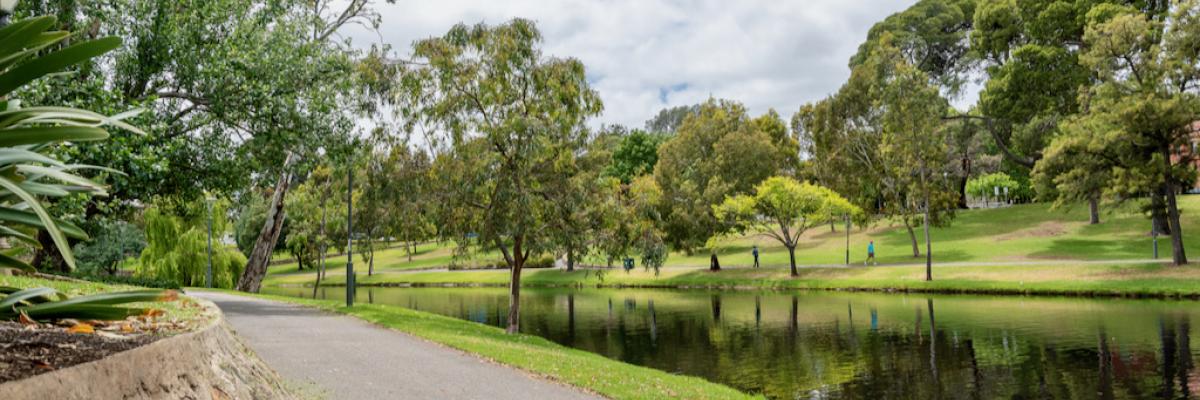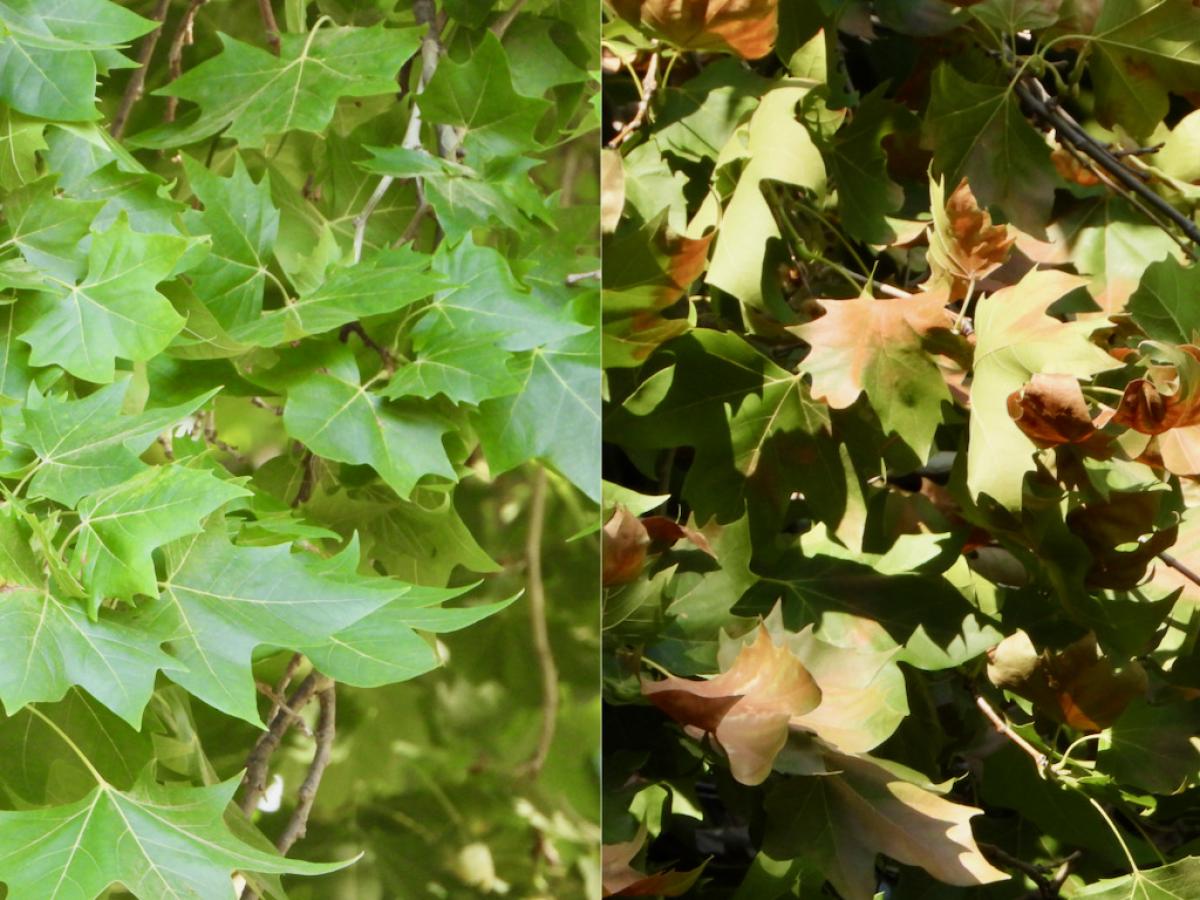Green Urban Futures
The recently released Climate Change Science and Knowledge Plan for South Australia states that: “Responding to our changing climate requires South Australia to prepare and adapt. To do this well, we need to be equipped with the best science and knowledge.”
A project team supported by the Environment Institute at the University of Adelaide.

Adelaide’s climate challenges
Adelaide’s future climate is projected to be increasingly hot and dry, with the temperatures rising and rainfall declining. The increase in extreme temperatures is especially alarming.
The recent, rapid growth in the number of extremely hot days in Adelaide will potentially have catastrophic impacts on human health, including the elderly and people with comorbidities. These temperatures will also adversely impact ecosystems and biodiversity, and it is crucial to future-proof Adelaide against these changes as quickly as possible.

Responding to Adelaide’s climate challenges
Green Urban Futures is a multidisciplinary team of researchers at the University of Adelaide who have united to provide significant solutions to major climate challenges now and for the future.Our researchers have wide-ranging expertise that can establish South Australia as a global leader in providing ‘green urban futures’ such as trees, green walls and roofs, cool surfaces, and the infrastructure required to enable these solutions.
Partnering with Green Urban Futures
-
How will our team help?
Our team will identify problems and deliver integrated, actionable solutions to:
- Better understand how to maximise the benefits (e.g., cooling, amenity, biodiversity, health) and minimise the costs of urban greening.
- Identify the best tree mix to make Adelaide a truly green city that is resilient to a changing climate.
- Assess the ecological behaviours and needs of different tree species, and how they translate to responses at different scales (e.g., lot, neighbourhood, suburb, city).
- Increase our capacity to implement greening strategies (e.g., water supply infrastructure, soils) and assess their potential co-benefits (e.g., flood control, water quality improvement).
- Understand the drivers of public acceptance and promote public participation in measures identified as most effective.
- Evaluate scenarios that stress-test the performance of potential solutions under a range of critical, plausible, future conditions, e.g., population, climate, demographics.
- Visualise and communicate green future alternatives through graphic, written, and conceptual methods.
-
Green Urban Futures areas of expertise
Green Urban Futures recognises that achieving a climate-resilient and ecologically vibrant city is not a case of re-imagining a static environment; instead, this transformation must be achieved in the face of hostile environmental change that is impacting all cities globally. By harnessing the power of world-leading research to foster the resilience of our natural and built environment, our university researchers can assist in delivering exceptional adaptations, and a green model for other arid cities to follow.
Green Urban Futures has the skill sets to provide significant data and solutions to:
- Identify the best species for selection as street trees.
- Monitor tree health, using both remote (e.g., hyperspectral, Normalised Difference Vegetation Index) and proximal (e.g., temperature, soil moisture, tree water status) methodologies.
- Forecast and model water requirements for healthy urban forests and smart watering to reduce heat2.
- Assist in planning for water sources and delivery for optimal use of this precious resource.
- Design landscapes suitable for cooling residential areas as well as urban centres.
- Assist with building design to minimise heat risk and monitor human health during peak stress periods; and analyse where the problem areas are and determine processes for decreasing future risk.
- Better understand the social drivers of canopy loss and how to engage communities in the preservation of valuable trees.
We also offer research and social science skills to assess and promote public acceptance and participation in the measures identified as most effective in adapting to challenging environmental conditions. There is also potential for pilot-scale projects to be trialled in collaboration with the University of Adelaide, at its North Terrace, Waite, and Roseworthy Campuses.
"Trees are the best way to cool cities, provide visual relief, increase biodiversity, and enable people to be happier and healthier. Trees should not be seen as a cost or a liability — they are a benefit. Professor Bob Hill
Currently, we are not planting enough trees because they complicate engineering requirements for underground services. Trees are also being removed because there is the mindset that they have no value, and their removal comes without cost. Our priorities must change. Fitting trees into the existing and future infrastructure will not be trivial, but it is essential to sustain the long-term health of our city and its people.
Download our brochure:
Green Urban Futures - our list of experts
-
Green streets and flourishing parklands
Areas of expertise
• Planning and design of constructed ecologies and urban planting.
• Greenfield development assessment.
• Monitoring, sensing, and management of streets and parklands through smart technologies.
• Visualisation of urban greening outcomes and scenarios.
• Modelling of built environment energy saving through green infrastructure.
• Understanding ecosystem services of the urban forest.Researchers
Professor Paul Babie, Adelaide Law School
Dr Tanya Court, School of Architecture & Built Environment
Dr Carlos Bartesaghi-Koc, School of Architecture & Built Environment
Dr Scott Hawken, School of Architecture & Built Environment
Professor James Hayter, School of Architecture & Built Environment
Mr Paul Leadbeter, Adelaide Law School
Dr Ramesh Raja Segaran, Director, Unmanned Aircraft Research Facility
Dr Ehsan Sharifi, School of Architecture & Built Environment
Professor Veronica Soebarto, Architecture & Built Environment
Ms Carmel Williams, School of Public Health -
Selection of tree species for urban spaces
Areas of expertise
• Reviewing and assessing living collections and urban plantings across Adelaide using international data.
• Monitoring water status and general health of trees in real time.
• Assessing heat damage to individual trees and groups of trees.
• Proposing solutions to ensure individual tree survival or replacement options where appropriate.Researchers
Professor Bob Hill, Director, Environment Institute
Dr Kate Delaporte, Curator, Waite Arboretum
Dr Vinay Pagay, Advanced sensing technologies -
Environmental engineering solutions
Areas of expertise
• Decision support (optimisation, multi-criteria analysis, trade-off analysis) and decision-making under uncertainty (sensitivity analysis, uncertainty analysis, scenario analysis).
• Climate impact analysis and adaptation (climate stress testing, adaptive pathways).
• Water sensitive urban design (alternative sources of water, smart systems, stormwater control), water quality, resources and supply, disaster risk analysis and mitigation (heatwave, bushfire, flooding, coastal inundation), water-energy nexus.
• Green networks and patch dynamics (landscapes that promote cool air flows, beneficial microclimates and adaptive ecologies).
• Urban agriculture for healthy and sustainable food productionResearchers
Professor Holger Maier
Dr Mark Thyer Environmental Engineering
Professor Seth Westra, Hydrology and climate risk
Associate Professor Luke Mosley, Water Research Centre
Dr Scott Hawken, Landscape Architecture and Urban Design
Professor Tim Cavagnaro, Soil Science -
Socio-cultural perceptions of environmental resource management
Areas of expertise
• Assessing public acceptance and participation in greening measures.
• Conducting interviews, focus groups, and collecting oral histories to evaluate social commitment to increasing green cover via tree planting and sustainable water management.
• Proposing policy solutions in response to public concerns.Researchers
Dr Georgina Drew, Anthropology and Development Studies
Dr Melissa Nursey-Bray, Social Sciences
Professor Paul Babie, Adelaide Law School -
Community health adaptation to extreme heat and climate change
Areas of expertise
• Assessing mental health impacts from extreme heat at local government level to develop tailored adaptation measurements.
• Assessing health challenges in sub-standard housing and working with building and landscaping to improve benefits.
• Developing tailored extreme heat and community health adaptation strategies for specific councils, based on their characteristics (e.g., landscaping, demographics)Researcher
Professor Peng Bi, Public Health and Environmental Medicine
Professor Anna Chur-Hansen
Dr Mark Kohler
Dr Adriana Milazzo
Professor Dino Pisaniello
Professor Carolyn Semmler
Professor Len Turczynowicz
Professor Deborah TurnbullCarmel Williams, School of Public Health
-
Remote sensing of environmental dynamics across platforms
Areas of expertise
• Multi-scale environmental senses with ground vehicles, drones, conventional aircraft and satellites.
• Sensing and monitoring urban land use, land surfaces and vegetation.
• Assessing condition, spatial distribution and change in greenspace and trees.Researchers
Dr Ramesh Raja Segaran, Director, Unmanned Aircraft Research Facility
Professor Megan Lewis, Environmental Remote Sensing and Geospatial Sciences
Dr Carlos Bartesaghi Koc, Architecture & Built Environment

Our researchers are working with a number of councils to develop smart stormwater solutions that reduce peak flows considerably, thus avoiding or minimising costly stormwater system upgrades, while providing water for urban greening.
Download the brochure
Feel free to share with your colleagues, councils, business and interested stakeholders.
Contact us
Would you like to discuss working with the Green Urban Futures team?
Professor Veronica Soebarto
Theme lead – Urban and Regional Landscapes
Environment Institute
School of Architecture and Built Environment
The University of Adelaide SA 5005 Australia
E: veronica.soebarto@adelaide.edu.au
T: +61 8313 5695
